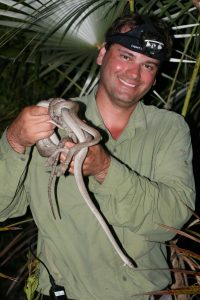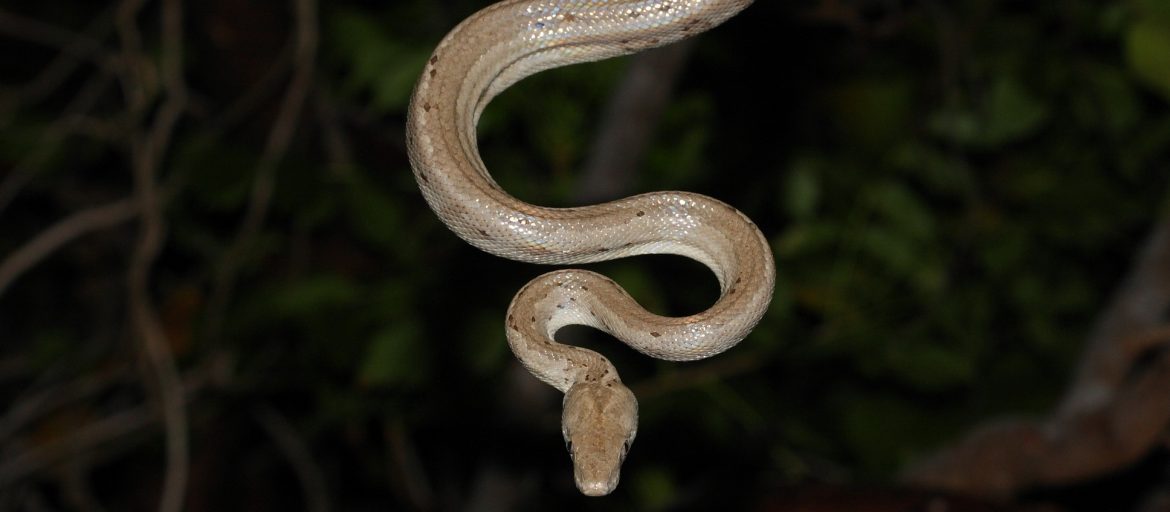When UNC Asheville Assistant Professor of Biology Graham Reynolds discovered a new species of snake in the Bahamas in 2015, he discovered something else, too—the Silver Boa, as it came to be named, was endangered. In fact, it’s the most endangered species of boa in the world.
Now Reynolds has a chance to help save the species he discovered with a grant from National Geographic, making Reynolds a National Geographic Explorer through 2022. The grant for $32,822 will fund at least four expeditions over two years to the Bahamas, where Reynolds and his team will begin the process of preventing the Silver Boa’s extinction.
“On the island we will be surveying for boas, and for each boa we will record as much data as possible, mark them with a microchip, and obtain a DNA sample,” Reynolds explained.
The project will require a multidisciplinary approach, and the expertise of Reynold’s research team, which includes collaborators from the North Carolina Zoo, the Bahamas National Trust, the University of Puerto Rico Mayagüez, and UNC Asheville students.
“The NC Zoo will bring a veterinary team to do health assessments on all the snakes,” Reynolds said. “We will also be conducting comprehensive habitat surveys to determine which areas of the

island can be ecologically restored from previous human and hurricane damage.”
Reynolds and his team will also be setting up camera stations and tracking stations to survey for invasive mammals such as rats and mice, which can impact the regeneration of the forest, and installing signs to keep people away from the sensitive habitat.
It’s exciting news for Reynolds—and for the Silver Boa, of course, which numbers only around 135—but it’s a huge opportunity for students, as well. Reynolds plans to take at least one UNC Asheville student with him on his 2020 expedition to the Bahamas.
“We are planning on obtaining DNA samples from the boas and not just bringing them back to the lab, but actually using a brand-new prototype device to sequence the DNA in real time in the field!” Reynolds said. “This will be the first time this has been tried on these Caribbean islands. The student will be in charge of learning to operate the DNA sequencer and running the experiments in the field from our expedition campsites using solar powered electronics.”
Reynolds and his team will also partner with Days Edge Productions, a film production company specializing in films about science, nature and conservation, to capture the expeditions and fieldwork, with the hope of producing a full documentary about the Silver Boa.
“Our goal is to use this grant to immediately intervene to prevent the extinction of the Silver Boa,” Reynolds said. “By the end of the grant term we will have a complete conservation plan in place and in action to ensure that the species has a path to survival.”
Update: Bill Nye the Science Guy
Reynolds’ work is now featured in Bill Nye’s Great Big World of Science, a New York Times bestselling educational book for children. The book recounts Reynolds’ reptilian encounter while sleeping on a research trip to the Bahamas, titled “Adventures in Zoology: There’s a Snake on my Face!” Reynolds also served as an official reviewer for one of the chapters in the book.
For more information on UNC Asheville’s Department of Biology, visit the webpage.
 A Silver Boa, first discovered by UNC Asheville Assistant Professor of Biology Graham Reynolds in 2015, is the most endangered boa in the world.
A Silver Boa, first discovered by UNC Asheville Assistant Professor of Biology Graham Reynolds in 2015, is the most endangered boa in the world.
Share
Permalink: